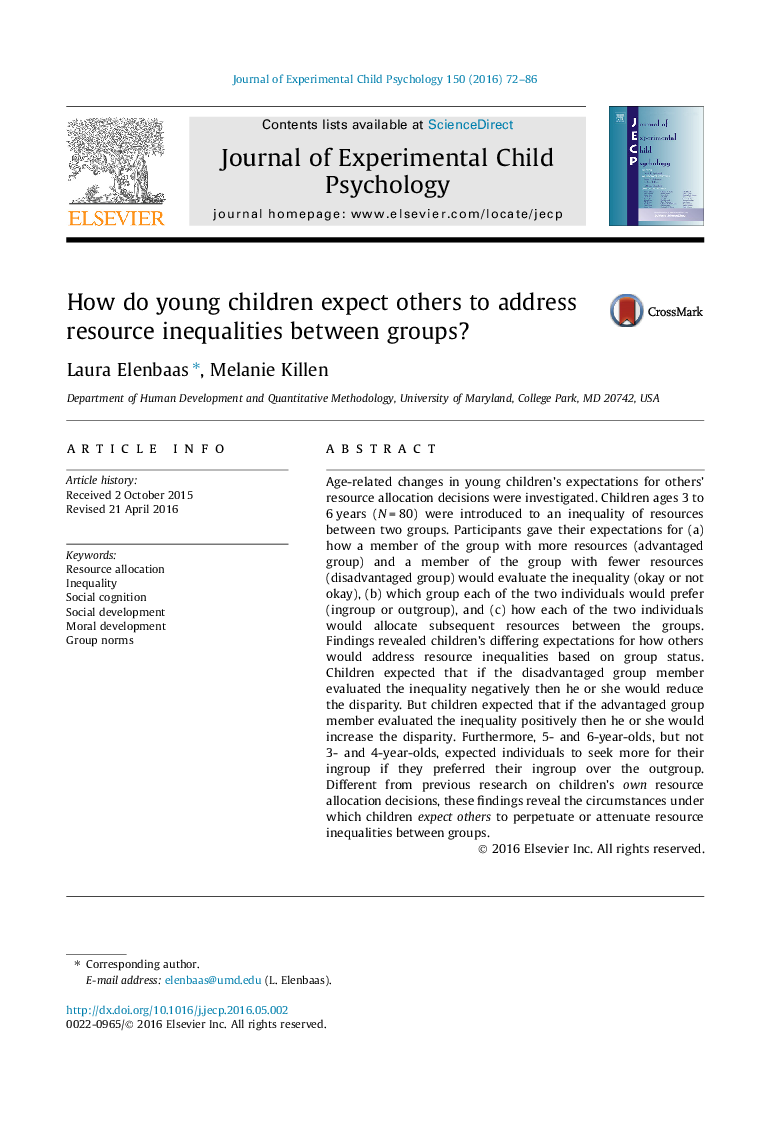| کد مقاله | کد نشریه | سال انتشار | مقاله انگلیسی | نسخه تمام متن |
|---|---|---|---|---|
| 7274486 | 1473462 | 2016 | 15 صفحه PDF | دانلود رایگان |
عنوان انگلیسی مقاله ISI
How do young children expect others to address resource inequalities between groups?
ترجمه فارسی عنوان
چگونه کودکان جوان انتظار دارند که دیگران نابرابری منابع را در میان گروه ها قرار دهند؟
دانلود مقاله + سفارش ترجمه
دانلود مقاله ISI انگلیسی
رایگان برای ایرانیان
کلمات کلیدی
تخصیص منابع، نابرابری، شناخت اجتماعی، توسعه اجتماعی، پیشرفت اخلاقی، هنجارهای گروه،
موضوعات مرتبط
علوم انسانی و اجتماعی
روانشناسی
روانشناسی رشد و آموزشی
چکیده انگلیسی
Age-related changes in young children's expectations for others' resource allocation decisions were investigated. Children ages 3 to 6Â years (NÂ =Â 80) were introduced to an inequality of resources between two groups. Participants gave their expectations for (a) how a member of the group with more resources (advantaged group) and a member of the group with fewer resources (disadvantaged group) would evaluate the inequality (okay or not okay), (b) which group each of the two individuals would prefer (ingroup or outgroup), and (c) how each of the two individuals would allocate subsequent resources between the groups. Findings revealed children's differing expectations for how others would address resource inequalities based on group status. Children expected that if the disadvantaged group member evaluated the inequality negatively then he or she would reduce the disparity. But children expected that if the advantaged group member evaluated the inequality positively then he or she would increase the disparity. Furthermore, 5- and 6-year-olds, but not 3- and 4-year-olds, expected individuals to seek more for their ingroup if they preferred their ingroup over the outgroup. Different from previous research on children's own resource allocation decisions, these findings reveal the circumstances under which children expect others to perpetuate or attenuate resource inequalities between groups.
ناشر
Database: Elsevier - ScienceDirect (ساینس دایرکت)
Journal: Journal of Experimental Child Psychology - Volume 150, October 2016, Pages 72-86
Journal: Journal of Experimental Child Psychology - Volume 150, October 2016, Pages 72-86
نویسندگان
Laura Elenbaas, Melanie Killen,
